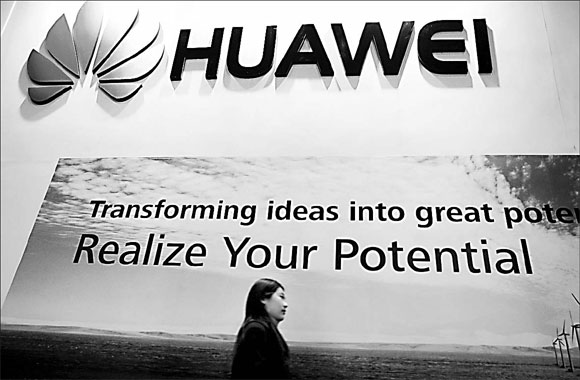


Over the past few years Chinese telecom equipment maker Huawei Technologies has grown into a serious threat to established Western giants.
Its relentless research and lower engineering costs have helped the rising technology star undercut its Western counterparts in prices and orders.
And Yu Chengdong, president of Huawei's Wireless Product Line, has found a new weapon to further increase market share - base stations with a "green" tag.
The wireless product line unit Yu controls generated $7 billion in global sales last year, with its energy-saving base stations playing a major role. The Shenzhen-based company claims its Green Sites Solution can reduce base station power consumption by up to 60 percent.
"Although many manufacturers are now embracing green solutions, Huawei has actually been one step ahead in developing the real products," says Yu in an interview with China Business Weekly.
"If you take a look at the roadmaps announced by all the manufacturers (to develop environmental solutions), Huawei is about one or two years ahead, which has taken many leading operators by surprise."
A recent report on its energy saving effort by Vodafone, the world's largest mobile phone operator by revenue, ranked Huawei as the No 1 supplier of green base stations. The study came on the heels of Vodafone's decision last May to give Huawei the company's Outstanding Performance Award "in recognition of its delivery of highly competitive products and services to Vodafone across the group's network".
China Mobile, the world's largest mobile phone operator by subscribers, has shortlisted Huawei as one of its four partners in energy saving and emission reduction.
Huawei's green push can be traced back more than 10 years, when the firm's cheaper solutions first began eroding the turf of Western giants.
Humble origins
"Green" was not the buzzword back then that it is today - Huawei's move was simply part of its "intention to help operators cut costs in building and operating networks", Yu says.
The manufacturer undercut bigger rivals by producing base stations that reduced the space needed for installation, a significant cost saving as operators usually rent space for their base stations.
That then gave Huawei engineers inspiration to develop base stations that can save costs in other ways, including often-enormous electricity bills
"Many manufacturers help operators' energy saving efforts by reducing the energy consumption of their telecom equipment. But our study on operators' total cost of ownership found the energy consumption of the equipment itself in fact accounts for only 40 percent of the total," Yu says. "The remaining 60 percent is from air conditioners and other equipment."
Base stations must be kept cool to prevent equipment from overheating, extend battery life and reduce the chance of network failure.
Huawei's Green Sites Solution employs an intelligent cooling system that enables operators to use fresh air as an alternative to air conditioning. Yu claims the system can save 30 to 70 percent of electricity used.
As well, its amplifier technology can boost the power efficiency of base stations by 45 percent, while its distributed architecture allows 20W base stations to have the same output frequency coverage as traditional 40W base stations.
In August 2006 Huawei won a landmark deal from Vodafone to expand the operator's network in Spain. Its green base station is believed to have played a major part in its successful bid. Huawei staked out about 70 percent of the network expansion contract, while Ericsson, the world's largest mobile telecom equipment maker, took the remainder. Ericsson before had a 70 percent share.
The deal is significant for Huawei as it previously focused on developing markets. In the Spanish deal, Huawei was awarded contracts to build networks in bigger cities including Madrid, while Ericsson was given small cities.
According to Vadafone, its existing equipment in Spain uses around 925W to produce an output at the antenna of around 20W. That consumption has now been cut to 480W to generate double the power output, saving an average of 3.9 mWh for each unit replaced, Vodafone says on its website.
Yu says Huawei last year supplied nearly 100,000 green base stations around the globe to leading operators such as Vodafone, Starhub in Singapore and Etisalat in the UAE.
He estimates that saves 570 million KwH of electricity a year, the equivalent of 170,000 tons of coal and the CO2 its burning produces.
Huawei's Green Sites Solution also integrates with environmental friendly energy sources such as wind, solar power and methane.
That has made mobile telephony economically and environmentally sustainable in emerging markets. Yu says Huawei's solar-powered solution has been adopted in 12 African countries.
An increasing number of operators are now looking at alternative energies, especially clean technologies, to deal with the challenges brought by climate change.
Huawei is also pushing the working environment of its base stations to the limits to help operators to cope with extreme weather.
In regions like Inner Mongolia where the temperature can be as low as minus-40 C during the winter, operators need heating to keep base stations warm and functional.
Yu says Huawei's base stations can function at temperatures above minus-10 C. Engineers are now working on new solutions that could enable base stations to operate at minus-20 C and even minus-40 C for outside installations, all of which would save enormous amounts of electricity.
Huawei reported $16 billion in contract sales last year, 72 percent of which came from overseas. With its technology strength matching or even exceeding its Western competitors and price wars intensifying, green solutions could be its next advantage, Yu says.
"Operators' demand for energy saving and emission reduction may vary in developing and developed countries. But it's the common wish for all operators to cut the total operating cost for their networks given the intensifying competition," he says.
"As a result, our Green Site Solutions, which can cut 30 percent in costs and 60 percent of CO2 emissions, are an attraction for all operators."
(China Daily 03/03/2008 page5)













